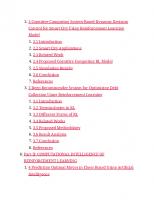Cognitive Analytics and Reinforcement Learning - Theories, Techniques and Applications 9781394214044, 9781394214037
The combination of cognitive analytics and Reinforcement Learning is a transformational force in the field of modern tec
135 103 10MB
English Pages 384 Year 2024
Table of contents :
Cover
Table of Contents
Series Page
Title Page
Copyright Page
Part I: COGNITIVE ANALYTICS IN CONTINUAL LEARNING
1 Cognitive Analytics in Continual Learning: A New Frontier in Machine Learning Research
1.1 Introduction
1.2 Evolution of Data Analytics
1.3 Conceptual View of Cognitive Systems
1.4 Elements of Cognitive Systems
1.5 Features, Scope, and Characteristics of Cognitive System
1.6 Cognitive System Design Principles
1.7 Backbone of Cognitive System Learning/Building Process [10]
1.8 Cognitive Systems vs. AI
1.9 Use Cases
1.10 Conclusion
References
2 Cognitive Computing System-Based Dynamic Decision Control for Smart City Using Reinforcement Learning Model
2.1 Introduction
2.2 Smart City Applications
2.3 Related Work
2.4 Proposed Cognitive Computing RL Model
2.5 Simulation Results
2.6 Conclusion
References
3 Deep Recommender System for Optimizing Debt Collection Using Reinforcement Learning
3.1 Introduction
3.2 Terminologies in RL
3.3 Different Forms of RL
3.4 Related Works
3.5 Proposed Methodology
3.6 Result Analysis
3.7 Conclusion
References
Part II: COMPUTATIONAL INTELLIGENCE OF REINFORCEMENT LEARNING
4 Predicting Optimal Moves in Chess Board Using Artificial Intelligence
4.1 Introduction
4.2 Literature Survey
4.3 Proposed System
4.4 Results and Discussion
4.5 Conclusion
References
5 Virtual Makeup Try-On System Using Cognitive Learning
5.1 Introduction
5.2 Related Works
5.3 Proposed Method
5.4 Experimental Results and Analysis
5.5 Conclusion
References
6 Reinforcement Learning for Demand Forecasting and Customized Services
6.1 Introduction
6.2 RL Fundamentals
6.3 Demand Forecasting and Customized Services
6.4 eMart: Forecasting of a Real-World Scenario
6.5 Conclusion and Future Works
References
7 COVID-19 Detection through CT Scan Image Analysis: A Transfer Learning Approach with Ensemble Technique
7.1 Introduction
7.2 Literature Survey
7.3 Methodology
7.4 Results and Discussion
7.5 Conclusion
References
8 Paddy Leaf Classification Using Computational Intelligence
8.1 Introduction
8.2 Literature Review
8.3 Methodology
8.4 Results and Discussion
8.5 Conclusion
References
9 An Artificial Intelligent Methodology to Classify Knee Joint Disorder Using Machine Learning and Image Processing Techniques
9.1 Introduction
9.2 Literature Survey
9.3 Proposed Methodology
9.4 Experimental Results
9.5 Conclusion
References
Part III: ADVANCEMENTS IN COGNITIVE COMPUTING: PRACTICAL IMPLEMENTATIONS
10 Fuzzy-Based Efficient Resource Allocation and Scheduling in a Computational Distributed Environment
10.1 Introduction
10.2 Proposed System
10.3 Experimental Results
10.4 Conclusion
References
11 A Lightweight CNN Architecture for Prediction of Plant Diseases
11.1 Introduction
11.2 Precision Agriculture
11.3 Related Work
11.4 Proposed Architecture for Prediction of Plant Diseases
11.5 Experimental Results and Discussion
11.6 Conclusion
References
12 Investigation of Feature Fusioned Dictionary Learning Model for Accurate Brain Tumor Classification
12.1 Introduction
12.2 Literature Review
12.3 Proposed Feature Fusioned Dictionary Learning Model
12.4 Experimental Results and Discussion
12.5 Conclusion and Future Work
References
13 Cognitive Analytics-Based Diagnostic Solutions in Healthcare Infrastructure
13.1 Introduction
13.2 Cognitive Computing in Action
13.3 Increasing the Capabilities of Smart Cities Using Cognitive Computing
13.4 Cognitive Solutions Revolutionizing the Healthcare Industry
13.5 Application of Cognitive Computing to Smart Healthcare in Seoul, South Korea (Case Study)
13.6 Conclusion and Future Work
References
14 Automating ESG Score Rating with Reinforcement Learning for Responsible Investment
14.1 Introduction
14.2 Comparative Study
14.3 Literature Survey
14.4 Methods
14.5 Experimental Results
14.6 Discussion
14.7 Conclusion
References
15 Reinforcement Learning in Healthcare: Applications and Challenges
15.1 Introduction
15.2 Structure of Reinforcement Learning
15.3 Applications
15.4 Challenges
15.5 Conclusion
References
16 Cognitive Computing in Smart Cities and Healthcare
16.1 Introduction
16.2 Machine Learning Inventions and Its Applications
16.3 What is Reinforcement Learning and Cognitive Computing?
16.4 Cognitive Computing
16.5 Data Expressed by the Healthcare and Smart Cities
16.6 Use of Computers to Analyze the Data and Predict the Outcome
16.7 Machine Learning Algorithm
16.8 How to Perform Machine Learning?
16.9 Machine Learning Algorithm
16.10 Common Libraries for Machine Learning Projects
16.11 Supervised Learning Algorithm
16.12 Future of the Healthcare
16.13 Development of Model and Its Workflow
16.14 Future of Smart Cities
16.15 Case Study I
16.16 Case Study II
16.17 Case Study III
16.18 Case Study IV
16.19 Conclusion
References
Index
End User License Agreement
Cover
Table of Contents
Series Page
Title Page
Copyright Page
Part I: COGNITIVE ANALYTICS IN CONTINUAL LEARNING
1 Cognitive Analytics in Continual Learning: A New Frontier in Machine Learning Research
1.1 Introduction
1.2 Evolution of Data Analytics
1.3 Conceptual View of Cognitive Systems
1.4 Elements of Cognitive Systems
1.5 Features, Scope, and Characteristics of Cognitive System
1.6 Cognitive System Design Principles
1.7 Backbone of Cognitive System Learning/Building Process [10]
1.8 Cognitive Systems vs. AI
1.9 Use Cases
1.10 Conclusion
References
2 Cognitive Computing System-Based Dynamic Decision Control for Smart City Using Reinforcement Learning Model
2.1 Introduction
2.2 Smart City Applications
2.3 Related Work
2.4 Proposed Cognitive Computing RL Model
2.5 Simulation Results
2.6 Conclusion
References
3 Deep Recommender System for Optimizing Debt Collection Using Reinforcement Learning
3.1 Introduction
3.2 Terminologies in RL
3.3 Different Forms of RL
3.4 Related Works
3.5 Proposed Methodology
3.6 Result Analysis
3.7 Conclusion
References
Part II: COMPUTATIONAL INTELLIGENCE OF REINFORCEMENT LEARNING
4 Predicting Optimal Moves in Chess Board Using Artificial Intelligence
4.1 Introduction
4.2 Literature Survey
4.3 Proposed System
4.4 Results and Discussion
4.5 Conclusion
References
5 Virtual Makeup Try-On System Using Cognitive Learning
5.1 Introduction
5.2 Related Works
5.3 Proposed Method
5.4 Experimental Results and Analysis
5.5 Conclusion
References
6 Reinforcement Learning for Demand Forecasting and Customized Services
6.1 Introduction
6.2 RL Fundamentals
6.3 Demand Forecasting and Customized Services
6.4 eMart: Forecasting of a Real-World Scenario
6.5 Conclusion and Future Works
References
7 COVID-19 Detection through CT Scan Image Analysis: A Transfer Learning Approach with Ensemble Technique
7.1 Introduction
7.2 Literature Survey
7.3 Methodology
7.4 Results and Discussion
7.5 Conclusion
References
8 Paddy Leaf Classification Using Computational Intelligence
8.1 Introduction
8.2 Literature Review
8.3 Methodology
8.4 Results and Discussion
8.5 Conclusion
References
9 An Artificial Intelligent Methodology to Classify Knee Joint Disorder Using Machine Learning and Image Processing Techniques
9.1 Introduction
9.2 Literature Survey
9.3 Proposed Methodology
9.4 Experimental Results
9.5 Conclusion
References
Part III: ADVANCEMENTS IN COGNITIVE COMPUTING: PRACTICAL IMPLEMENTATIONS
10 Fuzzy-Based Efficient Resource Allocation and Scheduling in a Computational Distributed Environment
10.1 Introduction
10.2 Proposed System
10.3 Experimental Results
10.4 Conclusion
References
11 A Lightweight CNN Architecture for Prediction of Plant Diseases
11.1 Introduction
11.2 Precision Agriculture
11.3 Related Work
11.4 Proposed Architecture for Prediction of Plant Diseases
11.5 Experimental Results and Discussion
11.6 Conclusion
References
12 Investigation of Feature Fusioned Dictionary Learning Model for Accurate Brain Tumor Classification
12.1 Introduction
12.2 Literature Review
12.3 Proposed Feature Fusioned Dictionary Learning Model
12.4 Experimental Results and Discussion
12.5 Conclusion and Future Work
References
13 Cognitive Analytics-Based Diagnostic Solutions in Healthcare Infrastructure
13.1 Introduction
13.2 Cognitive Computing in Action
13.3 Increasing the Capabilities of Smart Cities Using Cognitive Computing
13.4 Cognitive Solutions Revolutionizing the Healthcare Industry
13.5 Application of Cognitive Computing to Smart Healthcare in Seoul, South Korea (Case Study)
13.6 Conclusion and Future Work
References
14 Automating ESG Score Rating with Reinforcement Learning for Responsible Investment
14.1 Introduction
14.2 Comparative Study
14.3 Literature Survey
14.4 Methods
14.5 Experimental Results
14.6 Discussion
14.7 Conclusion
References
15 Reinforcement Learning in Healthcare: Applications and Challenges
15.1 Introduction
15.2 Structure of Reinforcement Learning
15.3 Applications
15.4 Challenges
15.5 Conclusion
References
16 Cognitive Computing in Smart Cities and Healthcare
16.1 Introduction
16.2 Machine Learning Inventions and Its Applications
16.3 What is Reinforcement Learning and Cognitive Computing?
16.4 Cognitive Computing
16.5 Data Expressed by the Healthcare and Smart Cities
16.6 Use of Computers to Analyze the Data and Predict the Outcome
16.7 Machine Learning Algorithm
16.8 How to Perform Machine Learning?
16.9 Machine Learning Algorithm
16.10 Common Libraries for Machine Learning Projects
16.11 Supervised Learning Algorithm
16.12 Future of the Healthcare
16.13 Development of Model and Its Workflow
16.14 Future of Smart Cities
16.15 Case Study I
16.16 Case Study II
16.17 Case Study III
16.18 Case Study IV
16.19 Conclusion
References
Index
End User License Agreement

- Author / Uploaded
- Elakkiya
- R.; Subramaniyaswamy V.
- Similar Topics
- Computers
- Cybernetics: Artificial Intelligence





![Machine Learning For Business Analytics: Concepts, Techniques, and Applications in R [2 ed.]
1119835178, 9781119835172](https://ebin.pub/img/200x200/machine-learning-for-business-analytics-concepts-techniques-and-applications-in-r-2nbsped-1119835178-9781119835172.jpg)


![Mastering Reinforcement Learning with Python: Build next-generation, self-learning models using reinforcement learning techniques and best practices [1 ed.]
1838644148, 9781838644147](https://ebin.pub/img/200x200/mastering-reinforcement-learning-with-python-build-next-generation-self-learning-models-using-reinforcement-learning-techniques-and-best-practices-1nbsped-1838644148-9781838644147.jpg)
